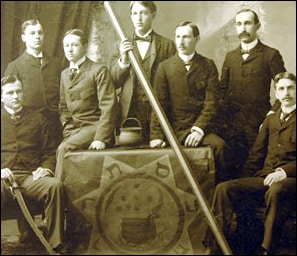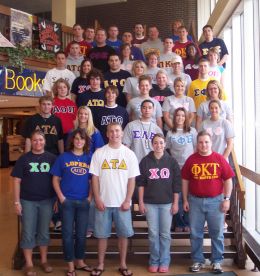A fraternity, as defined by the The American Heritage Dictionary is “a chiefly social organization of male college students, usually designated by Greek letters.”(pg. 523) This definition, however, is very limited and leaves plenty of space for short sighted people to believe the stereotype conveyed by the popular media, where fraternity members are depicted as drunks who accomplish nothing either scholastically or socially.
Unfortunately, both this definition and media portrayals fail to mention the fact that membership in a fraternity is a life-long experience that helps its members develop social, organizational, and study skills during college, and that teaches true, everlasting friendship. As a matter of fact, fraternities have a long tradition of high academic achievement, and most of our nation’s presidents were members of a Greek association. According to Irving Klepper, the first fraternity (Phi Beta Kappa) was founded for “social and literary purposes” at the College of William and Mary in Williamsburg, Virginia on December 5th 1776. After half a century of existence, it became and has since remained a scholarship honor society.
Throughout the nineteenth century, many new fraternities were founded, but none of these were permanent. Then, in 1825, the Kappa  Alpha Fraternity (now Kappa Alpha Society) was born at Union College. Two years later, Sigma Phi and Delta Phi had been founded at the same college, constituting the so-called Union Triad which was, in a large measure, the pattern for the American Fraternity system. By the end of the nineteenth century there were over thirty general fraternities in this country (pg. 18). Today’s fraternities still have all the characteristics and precepts of the their past fraternities: “the charm and mystery of secrecy, a ritual, oaths of fidelity, a grip, a motto, a badge, a background of high idealism, a strong tie of friendship and comradeship, and urge for sharing its values through nationwide expansion.” (Klepper pg. 18) In addition, today’s fraternities help their members develop many skills which are used in and out of college. During membership in a fraternity, one must learn leadership skills, because the chapter has to be run in a business-like manner and because it embraces different offices (President, Vice-President, Treasurer, Scribe, etc..) which are held by its members. These offices closely resemble the ones of real business. Additionally, since membership in a fraternity is seen as a great achievement by other Greek associations’ members, every brother must be able to uphold that office at any time.
Alpha Fraternity (now Kappa Alpha Society) was born at Union College. Two years later, Sigma Phi and Delta Phi had been founded at the same college, constituting the so-called Union Triad which was, in a large measure, the pattern for the American Fraternity system. By the end of the nineteenth century there were over thirty general fraternities in this country (pg. 18). Today’s fraternities still have all the characteristics and precepts of the their past fraternities: “the charm and mystery of secrecy, a ritual, oaths of fidelity, a grip, a motto, a badge, a background of high idealism, a strong tie of friendship and comradeship, and urge for sharing its values through nationwide expansion.” (Klepper pg. 18) In addition, today’s fraternities help their members develop many skills which are used in and out of college. During membership in a fraternity, one must learn leadership skills, because the chapter has to be run in a business-like manner and because it embraces different offices (President, Vice-President, Treasurer, Scribe, etc..) which are held by its members. These offices closely resemble the ones of real business. Additionally, since membership in a fraternity is seen as a great achievement by other Greek associations’ members, every brother must be able to uphold that office at any time.
Organization is a must for every member of a fraternity. Fund raising activities and community service always have a high priority in every chapter, and each member is required to organize and/or take part in many of these activities as a pledge, a brother and an alumnus. This helps individuals within the group to develop organization and planning. In addition, since the fraternity might be located in a house, each brother must learn household organization for his brothers well being. Fraternities are famous for their energetic social gatherings (parties) which require all of their members to be socially active and outspoken when the occasion calls for it. This helps fraternity members develop very strong social skills. Since the act of one member reflects over the acts of all the others, self-control and awareness of actions are mandatory. In addition, when the brothers live in fraternity houses, this adds to the development of social skills in the way that a member must be able to deal and live with different kinds of people in different situations. Since there are people of different scholastic levels in a fraternity, the member of the fraternity have access to a great deal of knowledge on many different school subjects. It is normal for fraternities to organize study groups regularly during the school year and especially before exams.
In addition, members might also use the opinion and advice of other members about the faculty in their favor, and most fraternities keep test files and other such study aids available for the benefit of their members. Most fraternity members are also eligible to receive a number of different scholarships and awards based on academic excellence, leadership, and personal achievement which can contribute to both the resume and the self-esteem of the person receiving such an honor.
Fraternities are also well known for their support toward their community. In fact, other than the usual, chapter-run projects, many chapters require their associate members to organize and participate in their own community service project before they can be initiated into full membership. This helps the fraternity to enhance their image, increase their popularity and their members’ awareness toward the community.
It is common for some fraternity members to stay active after graduating from college. In this way they can help the chapter in many ways and especially as “advisor of the real world.” It is also a positive experience for the graduate member, who will be able to keep in contact with the new and old members of his chapter. As Sidney S. Suntag wrote “I know of no better way to keep young than to associate with young people”(pg. 15). Even if some members are not able to remain active, the chapter can always count on them, since the spirit of fraternal brotherhood never dies. It is common for fraternities to build their houses and fund their activities with the support of their alumni. The number of alumni for a given fraternity in any urban area can range from a few dozen to several thousand. But the most important gift a fraternity can offer is a true and everlasting friendship that transcends the normal bonds between friends and ties them together as brothers for life. It is something no other organization can offer, and the bond that is formed between fraternity brothers is felt throughout the whole organization and not just local chapters. This explains why, when greeks of the same fraternity meet is felt like a reunion between blood brothers.
and especially as “advisor of the real world.” It is also a positive experience for the graduate member, who will be able to keep in contact with the new and old members of his chapter. As Sidney S. Suntag wrote “I know of no better way to keep young than to associate with young people”(pg. 15). Even if some members are not able to remain active, the chapter can always count on them, since the spirit of fraternal brotherhood never dies. It is common for fraternities to build their houses and fund their activities with the support of their alumni. The number of alumni for a given fraternity in any urban area can range from a few dozen to several thousand. But the most important gift a fraternity can offer is a true and everlasting friendship that transcends the normal bonds between friends and ties them together as brothers for life. It is something no other organization can offer, and the bond that is formed between fraternity brothers is felt throughout the whole organization and not just local chapters. This explains why, when greeks of the same fraternity meet is felt like a reunion between blood brothers.
Clearly, a feeling of comradeship is present not only within each fraternity, but between all of the members of Greek organizations. This can only lead to positive relations with the Greek community of a college or university, which is always fairly numerous at those institutions which have Greek organizations. As Brian Abramson stated in his interview, “If you look at any Greek organization at Florida International University, or any other College or University, you can find a catalogue of services which that organization provides for the benefit of the greater community through the service projects which it conducts every semester.” Tau Epsilon Phi, for example, participates in Bowling for Kids’ Sake every Spring, a tradition which began several years ago. Every fraternity has its own special philanthropy, as well as other public service projects which that fraternity takes part in from time to time. In fact, cooperating in public service not only provides the members of the brotherhood with valuable connections in the community, but it also serves to strengthen the bonds of brotherhood which hold the members together.
To keep true to the feeling of brotherhood in a fraternity, every member must be trustworthy and at the same time must be able to trust every other member which makes the bond of brotherhood even stronger. Unfortunately, a lot of people overlook fraternities during college because of the ominous, ever-present rumors about hazing. This image is also a part of the popular stereotype of fraternity  members.
members.
Hazing, as defined by the Fraternity Executive Association is “Any action taken or situation created, intentionally, whether on or off fraternity premises to produce mental, or physical discomfort, embarrassment, harassment or ridicule.”(pg. 48) As John P. Nykolaiszyn puts it, “If anyone is caught hazing, not only can fines be imposed upon the individuals, but conviction and even jail time could result. Organizations which practice hazing also run the risk of losing their charter and being closed down. As Mr. Nykolaiszyn states in his letter to the editor, “While some organizations may choose to haze and humiliate the people who try to rush them, that is in no way an accurate portrayal of all Greeks.” He goes on to point out the fact that, “Greek life is not just about partying and drinking. Greek life helps to build character, self-esteem and life long friendships.”(12) It is indeed very sad that many people are stuck with the “Animal House” view of fraternities and avoid looking into what fraternities are really all about.
Works Cited
Abramson, Brian D. Personal Interview. 1 Apr. 1996. Fraternity Executives Association “Statement of position on Hazing and Pre-initiation Activities” The portals of Tau Epsilon Phi Tau Epsilon Phi Fraternity, Inc. Atlanta, Georgia 1937 Klepper, Irving The portals of Tau Epsilon Phi Tau Epsilon Phi Fraternity, Inc. Atlanta, Georgia 1937 Morris, William, ed. The American Heritage Dictionary of the English Language. Houghton Mifflin Company, Boston, Massachusetts 1982 Nykolaiszyn, John P. “Hazing: Greeks get a bad rap.” The Beacon Feb. 13th 1996: 12.
